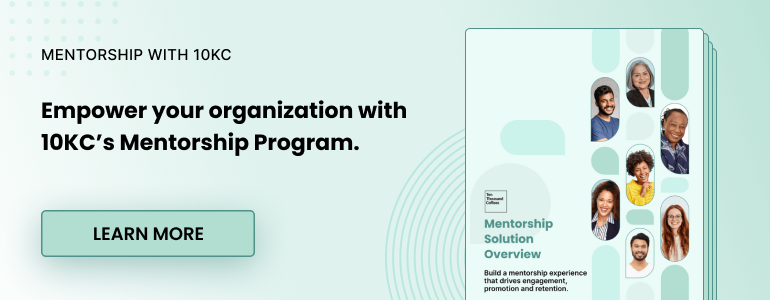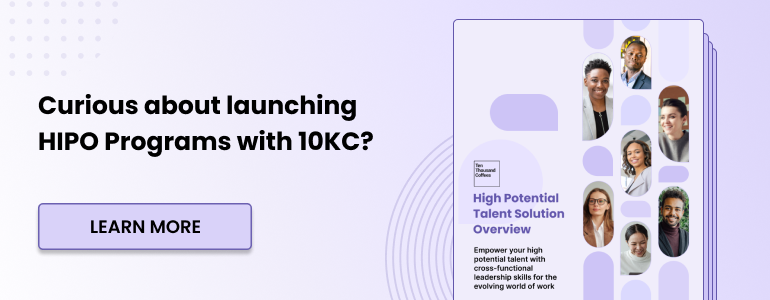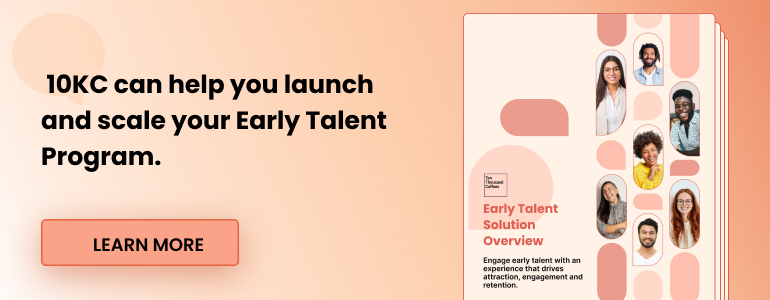Mentorship is recognized as a cornerstone of professional growth and development. Traditionally, we think of individual mentoring, where one mentor is matched with one mentee. But, depending on your organization’s needs, there’s an alternative: group mentoring.
If you’re looking for an innovative way to harness the benefits of mentorship programs at scale, group mentoring enables one mentor to guide multiple mentees simultaneously. In this article, we'll explore the differences between group and individual mentoring, share practical use-cases, and provide key insights for launching your own program.
What is group mentoring?
Group mentoring allows one mentor to support many mentees, offering a valuable alternative to traditional 1:1 mentoring. This unique mentoring model encourages collaborative discussions led by the mentor, making efficient use of their time and expertise.
During these shared learning sessions, mentees forge connections with a broader network of peers. This network enriches professional relationships and enhances learning journeys through exposure to a diverse range of perspectives.
Group mentoring is a powerful tool for your organization when faced with challenges like a shortage of available mentors. Additionally, mentors may feel overwhelmed with too many 1:1 mentee commitments.
Group mentoring vs. individual mentoring: what’s the difference?
At its essence, the main difference between group and individual mentoring is quite straightforward. Group mentoring involves one mentor guiding multiple mentees simultaneously, fostering a collaborative learning environment. Individual mentoring is a 1:1 relationship between a mentor and a mentee.
“Formal mentoring programs provide talent – especially diverse talent – with the skills and relationships needed to advance in their careers and create a sense of belonging to their organizations.” Dave Wilkin, CEO, 10KC
Both group and individual mentoring serve as great options within mentorship programs. They share the common goal of nurturing the growth and development of employees, and the value of mentorship programs is proven. Experts often point to mentorship as a meaningful way to attract and keep talent, and investing in a mentorship program can be invaluable for both your employees and the business.
62% of employees would leave their employer for one that offers mentorship opportunities. Additionally, employees with a mentor are more inclined to express satisfaction with their compensation compared to others without (79% vs 69%) and feel that colleagues value their efforts (89% vs. 75%).
Key differences for group mentoring include:
- Limited mentor availability: Group mentoring is often used when there is a scarcity of available mentors, efficiently spreading mentorship resources.
- Skill development focus: Ideal for programs geared towards skill development, such as collaboration, adaptability, and change management.
- Diversity in learning: Groups enrich the mentees' experience by exposing them to diverse perspectives within a peer learning environment.
- Coaching and leadership skills: Mentors benefit from honing their coaching and leadership abilities while working with a variety of mentees.
- Expanded Networks: Group mentoring extends the professional networks of both mentors and mentees.
Key differences for individual mentoring include:
- Versatility: Individual mentoring suits a variety of traditional mentoring models, including senior-junior matches, peer mentoring, and reverse mentoring.
- Personalized guidance: It offers an intimate mentoring experience tailored to address the specific challenges faced by the mentee.
- Deep relationships: Individual mentoring fosters close knit mentor-mentee connections.
In summary, the choice between group and individual mentoring is a strategic one, each offering its unique advantages. Group mentoring excels in optimizing mentorship resources, focusing on skill development, peer learning, and expanding professional networks. On the other hand, individual mentoring is versatile, offering personalized guidance and the chance to foster deep, lasting connections between mentors and mentees.

Key benefits of group mentoring for employees
Here, we’ll cover the key benefits of group mentoring, exploring how it can be a powerful and efficient tool for personal and professional growth in the workplace.
1. Scalable and efficient mentoring sessions
Group mentoring offers an efficient and scalable solution for hosting mentoring sessions. Mentors can effectively reach and support multiple mentees simultaneously. This makes it a practical approach for organizations seeking to optimize mentorship resources, accommodate more mentees, and empower mentors to maximize their impact efficiently.
2. Diverse peer-learning environment
In a group setting, mentees get exposed to a rich tapestry of experiences beyond their immediate circle. Facilitated group discussions stimulate creativity and expand perspectives. The diverse viewpoints encountered in these sessions contribute to mentees' well-rounded development.
3. Skills enhancement opportunities for mentors
Engaging with a diverse group of mentees challenges mentors to refine their facilitation and communication techniques, tailored to different learning styles and individual needs. Guiding mentees through their unique goals and challenges empowers mentors to cultivate versatility, empathy, and efficiency as leaders. This invaluable experience serves as a catalyst for mentors' own professional growth.
4. Professional networks expansion
Group mentoring extends a unique opportunity for both mentors and mentees to establish meaningful connections outside their immediate professional circles. Building relationships with colleagues across various departments and levels enriches their network, contributing to a more vibrant workplace community. These expanded networks often lead to unforeseen collaborations and opportunities.
5. Ideal for skills development-oriented programs
Group mentoring provides simple access to skills development, especially in areas such as teamwork, adaptability, and change management. Through facilitated group discussions and interactive activities, mentees gain practical insights and strategies for embracing change and fostering inclusivity and collaboration within the workplace.
Group mentoring examples: what is looks like in the workplace
Explore real-world group mentoring examples, including how it can benefit both high-potential and early talent with structured guidance for collective growth.
High Potential Talent
High potential (HIPO) talent development creates a strong pipeline of leaders. Organizations with an agile HIPO strategy are 70% more likely to have a strong succession bench. The problem? High impact development requires a hyper-personalized approach, which historically has been difficult to deliver at the scale required to build a deep leadership bench.
Enter the mentor, the crucial guide to help build the skills required for the next phase in a HIPO's career. However, the quest for enough available mentors for 1:1 development can be an uphill battle.
The solution? Successful mentorship programs can be deployed through tailored curriculum and relationship building sessions in a group setting. In these HIPO group mentorship sessions, a spectrum of topics can be explored such as:
- Strengthening leadership development
- Identifying growth opportunities
- Enhancing communication and collaboration
- Navigating conflicts
- Adapting to change
And it’s not just about skill development; it's about forging connections. In a group setting, high-potential talent can expand their network of peers and rely on one another for support and allyship throughout their leadership journey.

Early Talent
Entry-level employees, students, and new grads need formal onboarding, connectivity, and mentoring solutions. However, senior leaders’ busy schedules can make it challenging to effectively support early talent. Considering the fast-paced nature of hiring cycles and the demand for comprehensive support, there’s often little time for dedicated employee development.
This challenge becomes even more pronounced in remote or hybrid work environments, where building an internal network can be exceptionally challenging for newcomers. Even in office settings, without formal mentoring, early talent can feel adrift in unfamiliar waters. Some find it difficult to engage in the new and unknown culture, leaving them isolated.
So, where does this leave you? At risk of turnover with a big task at hand.
Group mentoring emerges as a powerful solution to use time more efficiently. It allows for unlimited early talent to be mentored together in joint sessions with a single mentor. With structured discussions, actionable advice, and a toolkit of resources, success becomes the norm.
In this group setting, a sense of community and belonging takes root. Early talent cohorts bond, learn from each other, network with leadership, and collectively grow. Group mentoring not only streamlines the onboarding process but also fosters a supportive environment where the next generation of talent can thrive and succeed together.

How to run group mentoring sessions
Understand how to effectively run group mentoring sessions with these essential steps for success, ensuring both mentors and mentees have an impactful experience.
1. Provide mentor and mentees with guidance
Running a successful group mentoring session demands thoughtful preparation. You can’t simply throw everyone in a room together and expect them to know what to do.
While mentors bring valuable experience to the table, it's essential to equip them with skills to navigate group dynamics and facilitate meaningful discussions. Navigating conversations, particularly with individuals from different backgrounds all together, is a learning process.
On the flip side, mentees also benefit from guidance on how to maximize their participation in the program. When both mentors and mentees receive support, the overall satisfaction and success of the group mentoring initiative is enhanced.
2. Build trust and get to know each other
Cultivating trust and fostering genuine connections lie at the heart of any successful mentorship program. Developing personal connections with members of the mentor group will help build empathy and psychological safety.
To lay this crucial foundation, allocate time at the program's outset for both mentors and mentees to introduce themselves on a personal level. Encourage participants to share what they value in their personal and professional lives. How do they envision the program shaping their careers?
This initial step helps break the ice and set the stage for a deeper connection among all members of the group.
3. Follow group discussion guides
Discussion guides are a fundamental aspect of structured group mentoring programs. They serve as the framework for each group session, offering clarity on objectives. Guides shouldn’t be rigid scripts, but rather a launching pad for meaningful discussions.
While not everyone has to contribute to every question, fostering an atmosphere where participants are encouraged to engage with at least one question is important. The mentor plays a pivotal role in this process, initiating discussions by providing their insights and then facilitating the mentees' contribution. This creates an inclusive environment where knowledge and experiences are shared and exchanged.
4. Schedule recurring sessions
Establishing a consistent schedule of recurring sessions is crucial for your group mentoring program. Similar to individual mentoring, cultivating meaningful connections and extracting value from the experience requires time.
Short-term, one-off courses or programs lasting only a couple months may not provide the necessary build-up for productive outcomes. Extended timelines allow for deeper trust, relationships, and impact to evolve.
Moreover, having a predictable schedule for group mentoring sessions benefits both mentors and mentees. It enables them to come prepared for each session and instills a sense of commitment to the program's long-term goals.
5. Reflect and measure impact
A great benefit of group mentoring lies in the diverse array of experiences and perspectives within the room. So, as the sessions unfold, encourage mentees to embrace moments of reflection and contemplate their newfound knowledge. How can it be applied to navigate their careers?
In addition to encouraging reflection, it's vital to incorporate regular feedback throughout the program. These periodic evaluations serve as touchpoints to gauge progress and address concerns.
The program's effectiveness can be measured through a combination of continuous feedback and comprehensive surveys conducted at the program’s conclusion. A multifaceted approach allows for the assessment of incremental progress and also provides insights into the program's long-term impact.

How to launch a group mentoring program
Keep on reading and learn how to successfully launch a group mentoring program to extract maximum value.
1. Have clear objectives
You’ve made the exciting 1st step by acknowledging the value of group mentorship. However, before you take that plunge, it's crucial to set clear, strategic objectives.These objectives will guide you, your participants, and your organization towards your desired outcomes.
To start, contemplate the specific results you aim to achieve with your group mentoring initiative. For example – are you implementing a group mentoring program to boost DEI strategies and promote inclusivity? Companies see up to a +24% increase of diverse talent at management level with a mentoring program.
Some additional goals and outcomes you might want to achieve include:
- Developing a pipeline of future leaders to improve talent mobility
- Encourage workplace connection amidst RTO or hybrid work environments
- Build a collaborative workplace to navigate through changes such as M&A
- Ensure a smooth onboarding process for new talent
- Boost employee sentiment for a more engaged, productive business
- Increase employee retention and decrease churn
2. Secure leadership buy-in
Senior executives must not only allocate budget, but also become genuine advocates. They should express, “I care about this, and where time permits, I'm going to participate.”
“This is not the same age old business case for diversity, equity, and inclusion. This is a business case for retention and promotability within your organization [...] Give them details on the cost of losing talent in our organizations. Give them stats on the cost of rehiring.” - Jarvis Sam, former Chief DEI Officer of Nike
Employee turnover and hiring replacements can cost a pretty penny. Emphasize that mentorship programs have a direct influence on employee engagement and retention, with profound implications for your company's culture, bottom line, and the professional development of employees. The time to invest in mentorship programs is now, and group mentoring provides a great option to do so scalably.
3. Craft an action-oriented curriculum
A good mentorship curriculum = the roadmap to ensure mentors and mentees extract maximum value. Curriculums also guide group discussions – a key factor of group mentoring to facilitate the exchange of knowledge from diverse perspectives.
Mentees should be empowered to participate in group-led relationship-building exercises, action-oriented conversations, and skill-building activities. At the same time, mentors can refine their leadership skills.
“Stop making people have to be naturally gifted at sponsorship and mentoring. That's where platforms like 10KC provide them with the conversation guides, the nudges, all of those experiences so that you can now 10x or 20x the amount of people that are ready to do this because they're enabled. We would never make every manager write and administer their own training for things like anti-bias or anything else. There's curriculums that are built and those are delivered, and it's the same thing with sponsorship and mentoring.” - Dave Wilkin, CEO, 10KC
Developing curriculums is a heavy lift, but you don't have to create these plans from scratch. 10KC provides ready-to-use program curriculums that can be tailored to the preferences and needs of your organization.

4. Attract participants
To ensure the success of your program, you need enthusiastic participants. Begin by presenting the program's key objectives to your team, along with the numerous benefits of group mentoring that we've highlighted earlier in this article.
For mentees, share that this offers an equitable path to career development, providing them with the skills and relationships for success. While mentoring often happens under the radar, group mentoring programs using platforms like 10KC actively combat bias and make mentorship accessible.
For mentors, make the benefit clear by sharing how this can be both part of their leadership growth as well as their overall contribution to equity and inclusion in the organization. Highlight that group mentoring offers a more efficient solution to optimize time and resources.
5. Harness technology
Doing everything manually is a massive undertaking. Thankfully, the right technology will streamline the entire program’s curriculum and execution.
Plus, measuring the return on investment (ROI) of your group mentorship program is crucial for demonstrating its value and ensuring ongoing support. To do this effectively, you'll need integrated software that allows you to keep track of employee sentiment and the program's impact.
"The modern approach to mentoring is leveraging technology. Oftentimes mentoring programs are pen to paper, or Excel files – it's a manual process. With Ten Thousand Coffees' smart algorithms and data matching we have an opportunity to capitalize in a really meaningful way, and embed this in our wider talent management systems. We're able to track progress and success." - Elizabeth Nelson, Director, Diversity & Inclusion, Thomson Reuters
How 10KC facilitates more impactful group mentoring programs
10KC is the only all-in-one platform for inclusive mentoring, networking, and skills development that drives better employee engagement and retention. Organizations rely on 10KC to build, manage, scale, and measure all of their mentoring and networking experiences in one fully integrated platform that employees love.
Here’s how it works:
Unbiased, automated group matching
No more manual matching or tedious communications. 10KC’s Smart-Match algorithm automatically matches group mentoring cohorts based on shared career goals, interests, and differences.
With 10KC’s Mentorship Program, your organization is given the option to enable group mentorship matching with the click of a button. This means 1 mentor can be matched and communicate with an unlimited number of mentees as a group, to the capacity of your choosing.
Curated curriculum
Effective facilitation and active employee engagement are crucial for successful group mentoring programs. 10KC provides a Group Mentorship curriculum that includes structured discussion guides, actionable next steps, and a comprehensive toolkit of resources. This empowers mentors and mentees with the tools they need to be set up for success.
Streamlined feedback and data-driven insights
10KC's robust feedback and reporting tool empowers you to optimize the mentoring experience and enhance program engagement. With built-in, customizable surveys, you can gather valuable participant feedback, and access program metrics related to participation, engagement, and sentiment.
Scalability made easy
10KC's platform makes it easy to implement group matching rules and scale your mentoring program effortlessly. By leveraging these tech-enabled capabilities, 10KC not only enhances the efficiency of group mentoring but also provides a more structured and impactful experience for mentors and mentees.










.png)